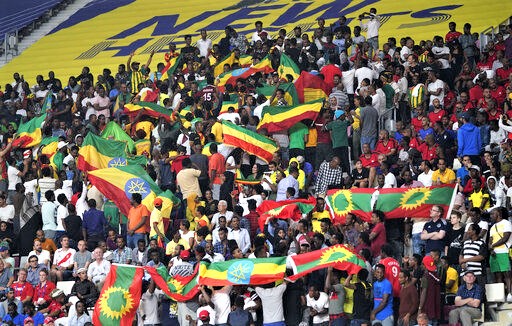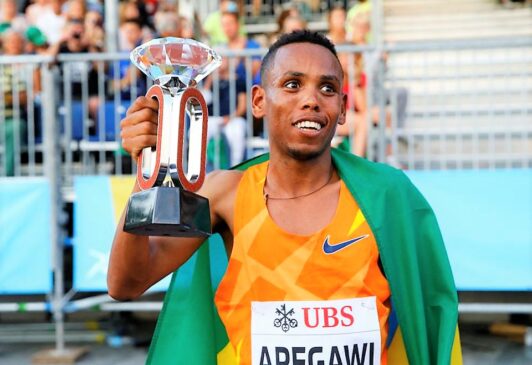Athletes united, but rival fans show Ethiopia’s divides

DOHA, Qatar (AP) — The Ethiopian supporters are the loudest in the stadium at the track world championships — because they’re trying to drown each other out.
As Ethiopian runners clean up on the track and celebrate together, the fans are divided into two rival political camps.
One group displays pictures of past monarchs like Emperor Haile Selassie and flies an older version of the national flag, one which some Ethiopians consider less inclusive. The other fans champion a long-marginalized ethnic group, which produces many of the nation’s great distance runners.
Around 100 fans from the Oromo ethnic group, many of them migrant workers living in Qatar, fly the flag of the once-banned Oromia Liberation Front at every distance race at the championships.
The world champion in the 5,000 meters, Muktar Edris, seemed to endorse them Monday when he picked up and wore an OLF flag thrown to him by fans after winning gold. That had disappeared when Edris arrived to speak with reporters, draped once again in the Ethiopian national flag.
A team official refused to translate a question from The Associated Press to Edris about the OLF flag, saying: “Athletes only represent their country, not a political party.”
The divisions between fans were starker in the women’s 10,000 on Saturday, when Sifan Hassan won gold for the Netherlands. She was born in Ethiopia’s Oromia region but left as a teenage refugee before eventually gaining a Dutch passport. The OLF-supporting fans backed her, but others were left cold by an athlete not wearing Ethiopia’s uniform.
At one stage, a group with the national flag moved down to the front of the stand to cheer Ethiopia’s runners, antagonizing the nearby OLF supporters. Qatari police moved in to keep the groups separate as they called to each other.
The Oromo are the largest of Ethiopia’s numerous ethnic groups, but have historically had little influence in the ruling classes, though the reformist Prime Minister Abiy Ahmed is Oromo.
In recent months, several parts of Ethiopia have experienced deadly unrest fueled by ethnic tensions and disputes over resources. In the past week, Ethiopian officials disclosed more than 1,100 people were killed in the unrest that is putting a strain on the reforms the new prime minister is taking in the East African nation.
The OLF previously waged guerrilla war against the Ethiopian state and remains controversial after its official return to the country last year by invitation of the new Ethiopian government. OLF members kept their arms and some have allegedly continued to commit violent acts amid a split between the group’s political and military wings.
The OLF says its members were not treated well after their return home last year and the government is still harassing their members.
In the Khalifa International Stadium, some Oromo fans were resentful of the group waving old-style national flags, accusing them of ties to the Ethiopian embassy and of wanting a return to the monarchy, which Ethiopia abolished 45 years ago.
“This is Oromia,” said Kemal Ketubo, in the crowd with the OLF flags. “We are supporting our team, the national team of our people.” Gesturing to the group with Ethiopian national flags, he said “they want the 18th century, like it was before.”
Fans waving Ethiopian flags dismissed the division. Zerhuan Lanta said the championships should be a moment of unity for Ethiopia, where distance running is by far the most popular sport.
“Every moment, you have to watch,” said Lanta. The divisions among the fans were just “a political issue,” he added.
Source: AP



